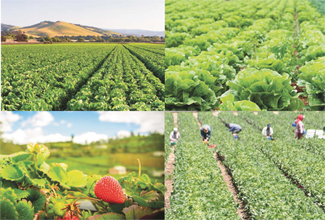Welcome to Blue Book!
Are you ready to join the thousands of companies who rely on Blue Book to drive smarter decisions? View our plans and get started today!
Still have questions? We’d love to show you what Blue Book can do for you. Drop us a line– we’ve been waiting for you.

California’s Salinas Valley is a remarkably resilient growing region. In recent years, Salinas growers have faced a barrage of challenges from labor shortages and food safety issues to destructive pests and devastating drought. While exploring these issues, we found how the industry manages to persevere, growing and shipping the majority of the nation’s leafy greens, along with other fruits and vegetables as well.
THE LABOR CHALLENGE
Despite the region’s ideal growing conditions and nickname—America’s Salad Bowl—things aren’t all rainbows and butterflies for Salinas Valley growers. Most producers agree that labor is their number-one issue right now. Thanks to immigration law changes and other factors, the region’s growers face a critical shortage of experienced workers.
This is particularly important with certain commodities, as some are much more labor intensive than others (i.e., the delicate multi-day hand harvests of strawberries versus the more hardy chop-and-pack of cauliflower). “Many of the crops grown here cannot be harvested mechanically, so this means lots of hands are needed throughout the season,” explains Norm Groot, the Monterey County Farm Bureau’s executive director. And although there’s ongoing research into new harvesting equipment, he believes it will be years until solutions are financially viable for most of the area’s farm operators.
Salinas does, however, have an advantage over other growing regions where workers are in residence for a short period of time then move on. “Since multiple crops are grown on each field, harvest crews are busy throughout the full season here, not just a few weeks of the year,” Groot says.
Guest Worker Programs
According to numbers from the Grower-Shippers Association of Central California, crews were down 25 to 30 percent during the 2015 harvest season. As a result, some growers faced the worst possible outcome: crops left to rot in the fields. This prompted some to leave the industry altogether and others to err on the side of caution—planting less for the next season. Unfortunately, Salinas growers predict the labor shortage will continue in 2016 and beyond.
“The labor situation has and will continue to be a challenge, and we’re looking into solutions such as guest worker programs to help,” explains Henry Dill, sales manager at Pacific International Marketing, a distributor, exporter, and processor in Salinas. “In some cases, we have reduced the size of our planted acres because of uncertainty about having enough labor for harvest.”
Consequently, Pacific International incorporated a guest worker program (H2A) with some growers for the first time last year. Although the federal program has been around for a couple years, it has not been smooth sailing. The paperwork is time consuming and the program can be expensive to set up. “But companies need to be proactive to assure they have crews when they need them,” Dill says.
Groot confirms many growers find the guest worker program difficult to manage, expensive, and slow to respond. “We continue to work towards comprehensive immigration reform nationally, which includes a guest worker program that works for more agricultural employers, especially small farm operators.”
Longer-Term Solutions
“We believe the Salinas Valley will see large volumes being harvested this summer, and in turn, a labor shortage,” comments Mike McDonald, chief executive officer of M&M West Coast Produce, Inc., abroker and distributor in Salinas. “We’re adapting by getting directly involved and putting together a long-term harvesting team of our own.”
Several growers are looking at housing as an opportunity to attract more workers to the Valley. Vegetable grower-shipper Tanimura & Antle, Inc. is building housing on company property for 800 workers, which is scheduled to be completed this year.




